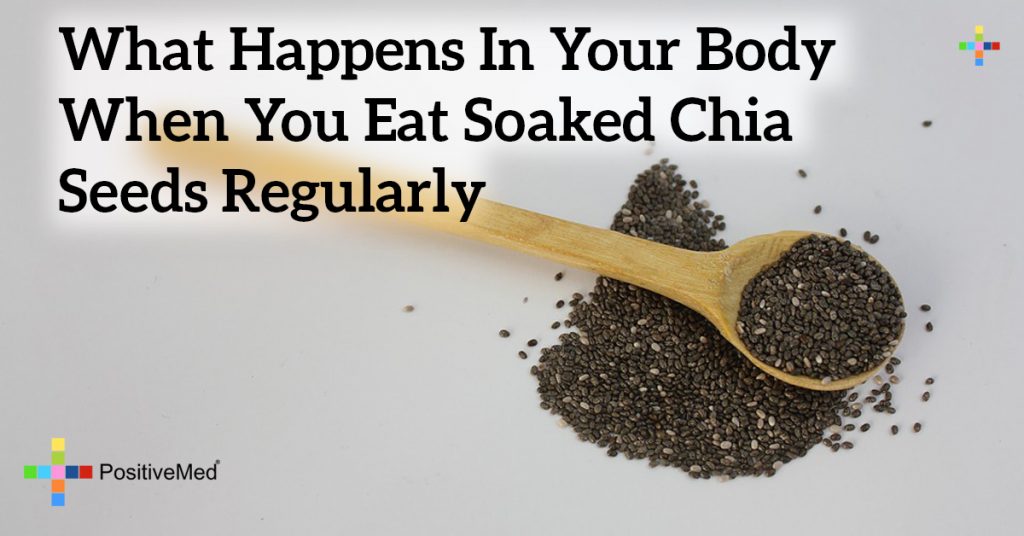
What Happens in Your Body When You Eat Soaked Chia Seeds Regularly
[nextpage title=”…”]
Most people may be familiar with the chia seed for its function in being spread over a uniquely shaped terra-cotta pot and growing into a fuzzy green “ch-ch-chi-chia” pet. However, these unique little seeds have far more value than those funky little animals. In fact, chia seeds are extremely good for your health and have benefits that include revving up your metabolism, increasing weight loss, reducing inflammation, and more.

What Are Chia Seeds?
The chia seed is an ancient superfood that has recently made a comeback on the health scene. The unique seed is a member of the sage family and was previously a staple in the diet of the Incan, Mayan, and Aztec cultures.
“Chia” literally is the word used for strength in the Mayan language. Previously in history, the black and white seeds were consumed as a mega-energy food, typically used by running messengers. The seeds were known for providing a “surge” of lasting energy that was necessary for carrying out important tasks, such as delivering important messages.
Today, the seeds have much the same benefit; however, they can support our health in a number of additional ways.
RELATED ARTICLE: Top Uses for Chia Seeds
What Are the Primary Nutritional Benefits of Chia?
Chia seeds are good for your health for a variety of different reasons. The innate nutritional structure of the seeds is what makes them such an important nutritional supplement. Chia seeds have been found to include:
• Twice the amount of protein of any other grain or seed
• Five times the amount of calcium in a glass of milk as well as the trace mineral boron, which helps transfer calcium to the bones
• Twice the amount of potassium found in bananas
• Three times the antioxidant benefits of blueberries
• Three times the amount of iron in spinach
• Generous amounts of omega 3 and omega 6 fatty acids
Additionally, chia seeds have been identified as a complete protein source, as they provide all of the essential amino acids in an easily digestible form. The seeds are also a good source of soluble fiber.
How Can Chia Seeds Support Overall Health?
[/nextpage] [nextpage title=”…”]
Chia seeds have been found to deliver a number of benefits to the body. These unique little seeds not only deliver a heft nutritional punch, the also have a number of added health benefits, including increasing energy, supporting strength development, improving endurance, balancing blood sugar levels, and aiding in intestinal regularity. Most importantly, though, chia seeds enhance metabolism, support weight loss, and reduce inflammation.
Metabolism Support
With their high amount of protein and other nutritional benefits, chia seeds support the function of the metabolism. The protein and antioxidants in these little seeds improve the overall function of your system and helps your body burn excess calories and stored fat as effectively as possible.
Weight Loss Benefit
Chia seeds are also a great support for weight loss. The seeds are not only high in fiber and protein, but they are also low in calories. So, as you consume them, you’ll get the benefit of feeling fuller and more satisfied for longer without taking in as many calories.
Inflammation Relief
Underlying inflammation is a common cause of poor health in many individuals. While it can be hard to find solutions for this issue, chia seeds are an ideal option. The seeds are high in omega 3 and omega 6 fatty acids, both of which are important for reducing inflammation in the body.
How Should Chia Seeds Be Consumed?
Chia seeds have a mild nutty flavor and are relatively easy to add into your diet. The seeds should be used as an addition to different recipes and foods rather than just a supplement on their own. Chia seeds are well-suited for adding into oatmeal, a smoothie, or even sprinkling over a salad. Additionally, they can be used to thicken up soup or even make a tasty pudding.
If you want to improve your health on all accounts with minimal investment, consider adding chia seeds into your daily diet.
[/nextpage]







